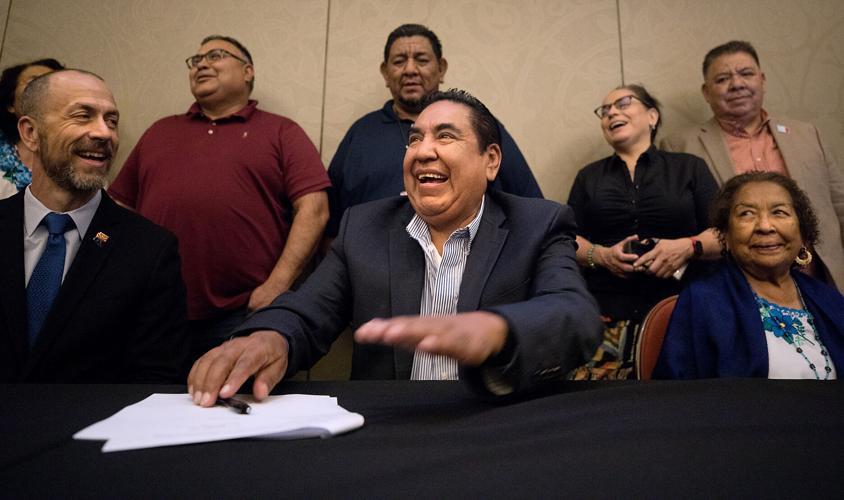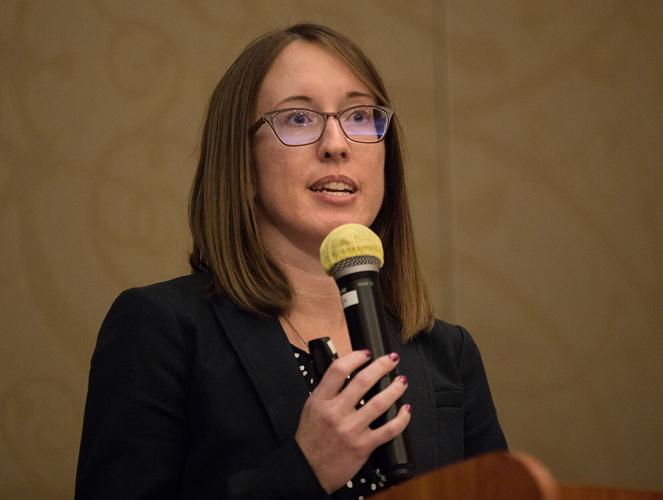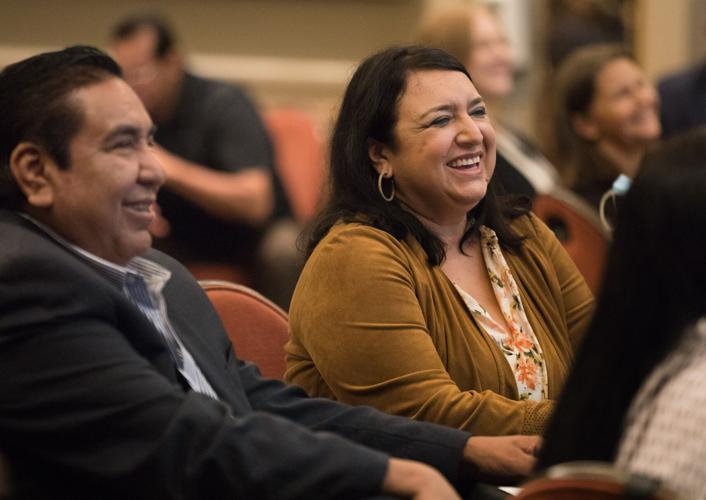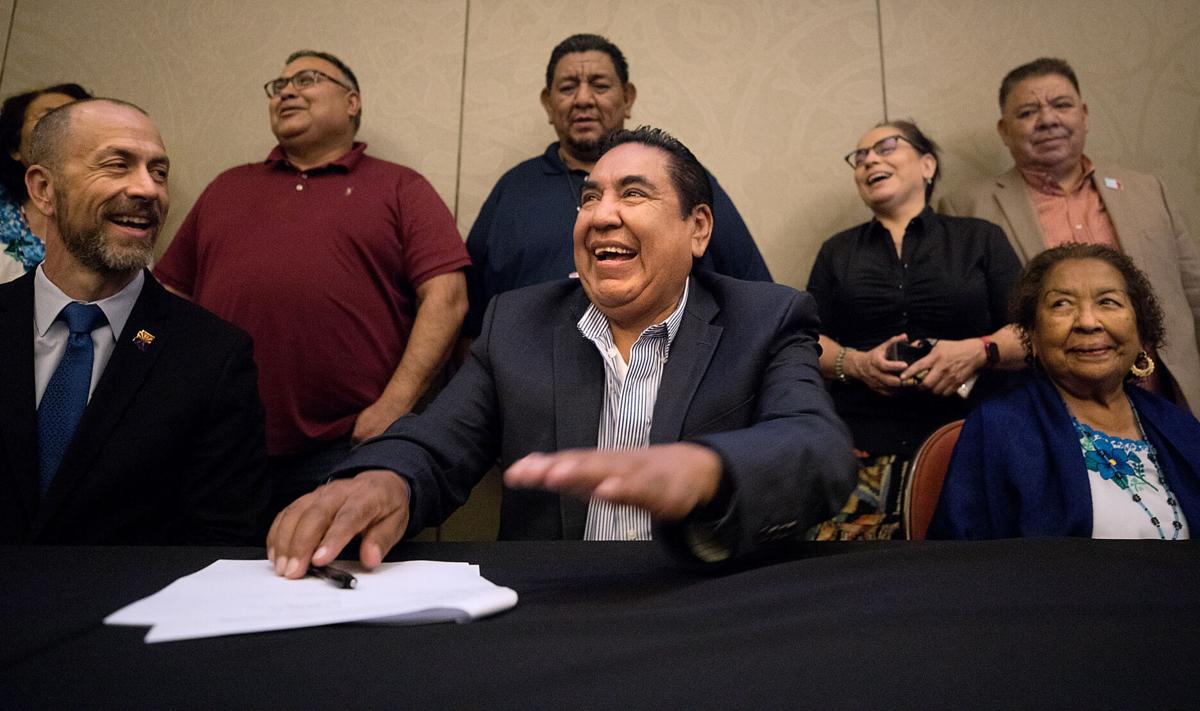Pascua Yaqui leaders and state child-safety officials signed a historic agreement Aug. 23 formalizing efforts to reunite tribal children who were removed from their homes with their families, or to place them with other Indigenous families, rather than separate them from their culture.
Among other steps, the first-of-its-kind agreement recognizes that the tribe has its own child welfare code that establishes preferences of placing children in homes within the Pascua Yaqui Nation or with other Native American families instead of with non-tribal families.
Many of the new safeguards have been standard practice in a Pima County specialty court, described by one federal official as a "national model."

Pima County Superior Court's Indian Child Welfare Act Court launched in January 2020 to improve case processing and outcomes while also protecting the best interests of Native American children. In the court's two-and-a-half years, data shows there's been a significant increase in children being placed with their parents, more involvement by the tribes, and shortened case times.
But the Yaqui agreement is hailed as an important addition to the system, especially in the face of potential changes by the U.S. Supreme Court to the child-welfare rights of Native American nations.
The federal Indian Child Welfare Act was adopted in 1978 after decades in which 25% to 35% of Native American and Alaska Native children and teens were removed from their parents — without tribal consent — by state and locally sanctioned child welfare and adoption agencies, according to the Association on American Indian Affairs, which estimates that 90% of those placements were in non-Indian homes.
The act, known as ICWA, was created to direct and guide certain aspects of Indian child custody proceedings in a state court to protect the relationship between the child and family and preserve a tribe’s ability to exercise its pre-existing tribal authority, according to the association.
The law requires state caseworkers to notify tribes when a child taken into custody might be a tribal member or is eligible to become one. After that, the case could be transferred to the tribe, depending on the circumstances.
For decades, ICWA has emphasized placement with relatives over strangers and family settings over group homes. If a tribal relative, a non-tribal relative or a tribal member's home is not available as an option for placement, it says the next best placement would be a family within another Native American tribe.
But with the U.S. Supreme Court's impending review of ICWA, some tribes — including the Pascua Yaqui Nation — are considering putting state-level protections into place, in case the federal law is overturned.
In the court case, Brackeen v. Haaland, Texas, Indiana, Louisiana and several individuals sued the federal government, saying ICWA is unconstitutional because it violates provisions of the Fifth and Tenth amendments of the Constitution. In 2018, a judge ruled in favor of the plaintiffs, but that ruling was overturned by the Fifth Circuit Court of Appeals.
Last year, the U.S. government, tribal officials and others asked the Supreme Court to review the case. While the tribes and federal government agree that ICWA is generally constitutional, they decided a review of the court's decision was appropriate given its narrow interpretation and decision to overturn specific provisions.

Tara Hubbard, Indian Child Welfare Act supervising attorney, talks about a memo of understanding between the Pascua Yaqui Tribe and the Department of Child Safety at Casino Del Sol Resort.
The Pascua Yaqui Nation, along with nearly 400 other tribes, has signed onto a brief supporting the review, and now is waiting to see how the case plays out, said Tara Hubbard, the Pascua Yaquis' supervising ICWA attorney.
With oral arguments set for early November and an opinion expected in the spring, Pascua Yaqui officials are looking into the possibility of creating a state ICWA, in case their federal protection goes away, Hubbard said.
'Helps secure well-being of our children'
In the meantime, they're celebrating successes as they come, including the August signing of the Memo of Understanding between the tribe and the Arizona Department of Child Safety.
Pascua Yaqui Chairman Peter Yucupicio and DCS Director Mike Faust signed the agreement during a ceremony at Casino Del Sol. During the signing, several tribal council members voiced their appreciation and support, saying they were making a commitment to protecting their children.
“I have five nieces and nephews that were in child welfare custody and they came to me to see if I could help out the family and I did, but it was five children all at once,” said Councilmember Angelina Matus.
“It was a big challenge, but through our tribe, and the resources and services, they assisted me and helped me with everything," Matus said. "It's a lot of work, not just for families, but for the social workers, the court attorney and everybody working together to provide the best for the children. This moment here today is just wonderful because it helps secure the wellbeing of our children.”
The agreement establishes a liaison between DCS and the tribe, which will put in place quarterly meetings where they can discuss what’s working well, what possible changes need to be made, policies and procedures and any questions that might pop up, Hubbard said.
The memo also set up procedures that require DCS to reach out to the tribe during the investigation phase of a case and for DCS to invite tribal officials to all meetings.
“As the leader of a child protection agency, it's difficult at times," Faust said, "but I think one of the things that we are committed to that is consistent with this community is the importance of family and community in the role of children.
“And to that point, our agency just made a change to our mission statement to specifically highlight that our job is to engage children, parents, family and the community to ensure safety, to strengthen families and achieve permanency, because community and family will keep kids safe before they come to our attention. I think this agreement solidifies that feeling and exemplifies that for all to see.”
January Contreras, assistant secretary of the Administration for Children and Families at the U.S. Department of Health and Human Services, called the Pascua Yaqui leadership's dedication to its children and families "forward-leaning" and inspiring.
"They built a model ICWA court with Pima County Superior Court tailored to keeping family safely together. They signed an agreement with DCS that is a mode for other tribes and states to learn from. These are advancements that don’t happen accidentally, it’s about family-centered leadership," Contreras told the Arizona Daily Star. "It was inspiring to spend a day with Pascua Yaqui Tribe leaders and staff."
The Pascua Yaqui Nation was recently awarded one of seven Administration for Children and Families grants for a tribal home visiting program, which Contreras called "another important piece of the foundation they're building."

January Contreras, assistant secretary at the Administration for Children and Families, during a luncheon to sign a memo of understanding between the Pascua Yaqui Tribe and the Department of Child Safety at Casino Del Sol Resort.
More families reunified
Pima County's ICWA court was developed by a team of lawyers, tribes, state agencies, judges, social workers and a law professor, working collaboratively with tribes, states and local agencies. It was started with support from Casey Family Programs, a national foundation that works with tribal nations across North America to influence sustainable improvements to the well-being of children, families and communities.
Pima County's ICWA Court uses technology and data to assess performance, provide training and identify areas needing improvement.
Superior Court Judge Kathleen Quigley worked with the Pascua Yaqui and Tohono O'odham tribes for years before ICWA court was launched, saying that at the time, there were between 150 and 175 ICWA cases spread out among the court's 14 judges.
"This is a federal law and it's a different application, taking a federal law and applying it to a state process," Quigley said.
By creating a designated ICWA court, judges, attorneys and social workers assigned to the cases were guaranteed to be experienced with the laws and process that apply to ICWA cases, Quigley said. And because it's a smaller group of judges, lawyers and social workers, communication happens more easily and teams can discuss several cases at one time.
"We have a better relationship, we know each other," Quigley said. "Now we have an experienced bench and experienced attorneys, and when the tribes intervene, they have really experienced tribal attorneys and social workers."
Superior Court Judge Janet Bostwick is also involved in Pima County's ICWA court.
"It's been terrific and big for the advancement of the goals of families being reunified and children staying in the community," Bostwick said.
Pima County has tracked data from the start, comparing the outcomes of ICWA and non-ICWA cases.
Before the court was started, only 38% of children in ICWA cases were placed with their parents at the case's closure, compared to 64% of children in non-ICWA cases, according to the county's data.
Now, the number of children in ICWA cases that are placed with their parents has increased to 68%, compared to 76% in non-ICWA cases.
Participation in cases by fathers, tribal caseworkers and tribal lawyers has also increased substantially, although Quigley cautioned that the fathers' increased presence may have more to do with the court going virtual during COVID.
The time for ICWA cases to reach closure has also decreased since the court's creation, and data shows that cases are getting off to a faster start.
"The results do seem to say that parents are engaging more and this process is working better," Bostwick said. "And the extra support for parents is amazing."
In addition to the attorneys and DCS social worker that are part of non-ICWA cases, ICWA cases typically also involve a tribal attorney and social worker.
"The tribal social workers supplement the DCS coworkers in amazing, culturally sensitive ways," Bostwick said.
While parents in ICWA cases might not always feel safe or comfortable with DCS, having other people in the room who they can relate to has proven to be a big asset, she said.
In addition, the court has brought in local agencies, including social service and behavioral health provider Crossing Arrows Counseling Services, to help provide culturally appropriate services for tribal members, including group therapy for parents.
"Parents are more wiling to speak up in a group of people they relate to," Bostwick said.
11 tribes now use the court program
Support for the program is also growing. When Pima County's ICWA court started in 2020, two tribes were involved. Now, 11 tribes have signed on to participate.
Pima County's ICWA court is one of just 17 in the nation, but Bostwick and Quigley say work to preserve tribal culture during the removal and reunification process is spreading.
"The leadership combination of the Pascua Yaqui Tribe and the Pima County Superior Court makes all the difference," HHS' Contreras said. "I see them work together with humility and transparency to keep families safely together and I think the rest of the country has a lot to learn from them. The ICWA family and cultural safeguards being honored by the tribe, the court, and DCS are a national model."
Hubbard, the Pascua Yaquis' supervising ICWA attorney, said "the data is really promising. It shows that ICWA court works."
"It's not perfect, but it's progress," Hubbard said, adding that she's in conversations with Pima County officials about possibly encouraging Maricopa County to develop an ICWA court of its own.
Hubbard said the recently signed agreement with DCS was nearly a decade in the making, and that having the practices put down in writing is important for Yaqui families.
Many of the details of the agreement are best practices that have been in place for years between DCS and the tribe, Hubbard said, but the memo will provide consistency and sustainability.
"We are so excited to finally have it done."








